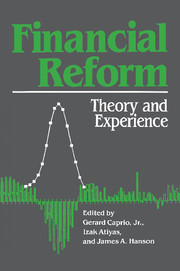Book contents
- Frontmatter
- Contents
- List of figures and tables
- Foreword
- Acknowledgments
- List of contributors
- Financial reform
- 1 Introduction
- Part I Reforming finance: Approaches and importance
- Part II The reform experiences
- Part III Liberalizing the capital account and domestic financial reform
- Part IV Summary
- Bibliography
- Index
Foreword
Published online by Cambridge University Press: 20 May 2010
- Frontmatter
- Contents
- List of figures and tables
- Foreword
- Acknowledgments
- List of contributors
- Financial reform
- 1 Introduction
- Part I Reforming finance: Approaches and importance
- Part II The reform experiences
- Part III Liberalizing the capital account and domestic financial reform
- Part IV Summary
- Bibliography
- Index
Summary
The reform of financial systems is an area of economics that has led broader swings in economic thought. At times economists – going back to John Stuart Mill – and policymakers have viewed the financial sector as irrelevant, except in times of crises, and hence have tried to repress finance and use it for the convenience of government. More recently, the pendulum has swung back toward Schumpeter, who viewed finance as the key sector for its role in allocating credit efficiently. In the past 20 years the move has been toward financial sector deregulation, in part out of ideology and in part in response to technological change, which has made regulatory arbitrage a popular sport. Among developing countries, initial reform efforts in finance – the Southern Cone experience – had such well-publicized problems that the reform effort lost some momentum.
However, other countries did persevere in attempting to reform their financial systems, not always as dramatically as in the earlier experiments, and in some cases in a less far-reaching manner. But reform they did, making it appropriate to look at these cases and review their successes and failures. While economists always want a bigger cross section and a longer time series, authorities in many countries, including those with very low incomes and the formerly socialist economies, need to know what has worked and what has failed. Thus the present study is without doubt a timely one.
- Type
- Chapter
- Information
- Financial ReformTheory and Experience, pp. xiii - xivPublisher: Cambridge University PressPrint publication year: 1995

